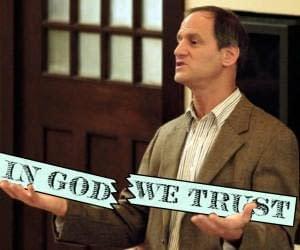Michael Newdow Wants “Under God” Removed From Dollar
 Persistent Atheist Says G-d’s Got To Go From The Currency
Persistent Atheist Says G-d’s Got To Go From The Currency
Michael Newdow still doesn’t want God mentioned on U.S. currency. In his latest lawsuit he even avoids properly spelling the word throughout most of the written complaint.
Even his fellow atheists think Michael Newdow has a better chance of winning at Powerball than succeeding in his latest lawsuit to take an eraser to “In God We Trust.” Over the years Newdow has been involved in numerous attempts to remove public religious references, including a lawsuit to keep prayer out of President Barack Obama’s 2009 inauguration.
That effort earned him a brisk smackdown, but that’s not how he saw it. In an email to supporters, he wrote, “Okay — it’s time to celebrate. We lost, nice and quickly. It may sound disingenuous, but I have always advocated for losing in the District Court if possible. Basically — except for findings of fact (which rarely exist in constitutional cases such as this) – it is advantageous to lose.”
In other words, he seeks to move the Overton Window, one lawsuit at a time.
If At First You Don’t Succeed…
Here’s how it works. Today you lose, but you advance the cause incrementally by making the proposition slightly more politically acceptable. Then you try again.
Newdow just tried again. On January 11 he filed a federal lawsuit in Akron, Ohio to have “In God We Trust” removed from the currency. It’s his next step after a similar lawsuit was quickly dismissed in New York in 2013. Newdow wasn’t listed on that lawsuit — his mother was on it, though — but he was a key player.
That lawsuit argued that the First Amendment’s Establishment Clause prohibited religious references on currency. The court didn’t agree, so this time Newdow is back with an additional argument based on the Religious Freedom Restoration Act (RFRA).
Don’t Trust God?
Here’s a sample from the lawsuit describing one of the 41 plaintiffs:
“Plaintiff New Hoe Parent #1 is also an Atheist. Accordingly, he definitely does not trust in any G-d. Thus, when using United States currency, he is unwillingly confronted with the governmentally-mandated “In G-d We Trust phrase. This substantially burdens him in the exercise of his religion in a number of ways. First, he is essentially forced to choose between either relinquishing the convenience of carrying the nation’s money, or bearing on his person a religious message that is the complete antithesis of his Atheistic beliefs. Second, exercise of his Atheism requires that he maintain honesty, and it is absolutely dishonest for him to carry the false message that “We (i.e., Americans, of which he is one) trust in G-d. Finally, by passing American money to others (at times during foreign travel), he is proselytizing for a religious notion (i.e., Monotheism) that he finds false.”
In other words, “Defendants have substantially burdened Plaintiffs in the exercise of their Atheistic beliefs,” therefore “Defendants have no compelling interest to justify these burdens.” Thus RFRA has been violated.
The defendants, by the way, include Congress and officials from the Treasury Department, United States Mint, and Bureau of Engraving and Printing.
Newdow’s RFRA strategy doesn’t rely only on the plight of atheists. That’s where the ‘G-d’ comes in. One of the plaintiffs is a Jewish man who believes the explicit use of ‘God’ is disrespectful to the Creator. Using G-d in the lawsuit is a tactic to show that even a religious person can be offended by seeing it on the currency.
Will it work? If Newdow fails again, he plans to take it to the next court.
Constitutional Law(suits):
What Newdow’s trying to accomplish here is an example of Constitutional litigation. That’s another way of saying that he’s trying to challenge Constitutional law, which has to do with what the government can and can’t do. You know, the stuff in the Constitution.
These types of cases, historically, have been extremely important in establishing the America we know today. Of course, these past instances I’m referencing here dealt with… how you say… higher stakes. For example: the abolishment of slavery.
So, again, Constitutional litigation is a key part of our political system. Helps make sure that important stuff can be addressed, like civil rights. And while challenging the Constitution isn’t straightforward or easy by any stretch of the imagination, we need to be aware of how it works and make sure American society is capable of constructive progressiveness.
Hire Nashville Constitutional Lawyers
At Turner Law Offices, P.C., our team of attorneys has years of experience working with clients across a vast range of cases — and that includes Constitutional law. If you think you might have grounds for such a lawsuit, don’t shrug it off! America can’t keep getting better if its people are too meek to try and make changes. Call today, or go online to set up your Free Initial Consultation, and meet with one of our skilled lawyers who’s ready and waiting to guide you in your campaign for justice.







